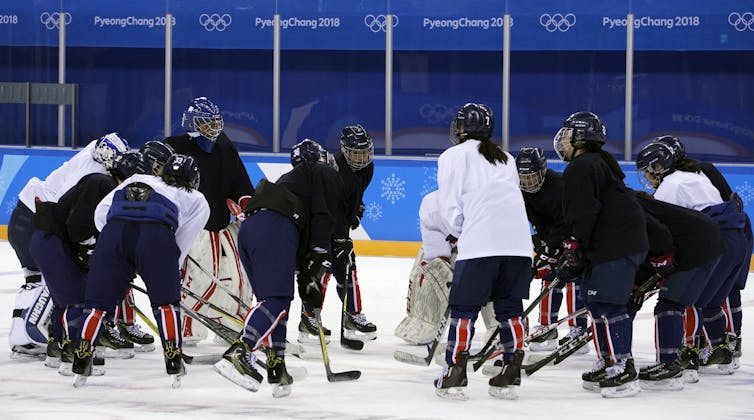2018 Winter Olympics set to begin against the backdrop of warm words and cold politics
- Written by David Rowe, Emeritus Professor of Cultural Research, Institute for Culture and Society, Western Sydney University
Mega sporting events are always heavily infused with politics, but the impending Winter Olympics in Pyeongchang, South Korea, have almost been buried in a geopolitical avalanche.
Global tensions over North Korea’s nuclear and missile programs were suddenly complicated by its belated decision to take part in the Olympics and, for the first time, in the Winter Paralympics.
Read more: The Winter Olympics and the two Koreas: how sport diplomacy could save the world
It’s not just academics, diplomats and journalists who have talked up the wider significance of North Korea’s involvement. The Olympics’ own organising committee has said North Korea’s inclusion has intensified interest in the event.
Tensions on the Korean Peninsula
The focus has understandably been on North Korea. The reunification of the Korean Peninsula is a key political aim of both Korean governments, whose relationship is in a constant state of flux. Major world powers, not least China and the US, closely watch developments.
Improving its relations with the north, and so promoting regional and world peace, was a promised political legacy in Pyeongchang’s bids for the 2010, 2014 and 2018 Olympics. Third time lucky, it will provide the stage for the two Koreas to march together, carrying the unified Korean flag, at Friday’s opening ceremony.
They will then play together as one in women’s ice hockey. The North Korean players have stayed at the Olympic training centre in South Korea in a belated attempt to weld previously separate sides into a team. “We are one” is the motto of this first unified Korean team in Olympic history.
In this case, taking part in the Olympics as a single entity has far outweighed the imperative of winning a medal. Some South Koreans feel their superior performing women’s team has been sacrificed on the altar of global politics, although they were not among the leading medal contenders before this forced sporting marriage.
The lead-up to the event has seen several surprises. One of these was the last-minute cancellation of the joint pre-Olympic cultural event at North Korea’s Mount Kumgang. The hosts complained they were insulted by South Korea’s media criticism, including of a massive military parade in the North Korean capital Pyongyang scheduled for the day before the Olympics begin.
Given all this inter-Korean volatility, it is uncertain whether any amity developed via the Olympics will be sustained after the event. Displays of unity might suggest a symbolically significant political breakthrough. Yet protests in South Korea that these are now the “Pyongyang Games” hijacked by northern political propaganda demonstrate that not everyone has bought the message of peace and love.
Read more: Despite good intentions, the Olympics has its limits in promoting peace
 South and North Korea will play together as one in women’s ice hockey in Pyeongchang.
EPA/Srdjan Suki
South and North Korea will play together as one in women’s ice hockey in Pyeongchang.
EPA/Srdjan Suki
The broader political implications
The Pyeongchang Olympics’ politics extend well beyond the Korean Peninsula. The Games are sandwiched between the 2014 Sochi Winter Olympics and the 2018 FIFA World Cup – both of which represent heavy political investment in sport diplomacy by Russia.
Russia has been embroiled in the scandal of state-sanctioned doping at Sochi. Their team banned from Pyeongchang, Russian athletes have been required to prove they are clean in order to compete there as individuals under the Olympic rather than their national flag.
Read more: Russian Olympic doping saga shows need for a radically different approach
It is typical of the political drama surrounding these Olympics that the Court of Arbitration for Sport (CAS) upheld appeals by 28 of 39 Russian athletes against their lifetime Olympic bans. The International Olympic Committee (IOC) is considering its own appeal – but it cannot do so before the Pyeongchang Games are over.
The IOC has refused to invite the 15 cleared athletes – two of whom are now coaches – to join their 169 compatriots participating as neutrals in Pyeongchang.
But just two days out from the Games, the CAS must consider further appeals by 32 athletes against their exclusion.
With Russia also involved in a series of skirmishes with the West – including allegations of interference in the 2016 US presidential election and the UK’s Brexit referendum – the involvement of Russian athletes in the Olympics will be closely scrutinised.
Apart from international relations and sport diplomacy, there are wider political concerns regarding the Winter Olympics. Is it a playground for wealthy developed countries, especially from the global north, where they can flaunt their affluence in the faces of the poorer nations of the world? This global inequality is exacerbated in the Paralympics, where expensive, sophisticated technological and other support is required.
Read more: The odds are stacked against athletes from poor countries in paralympic sport
Also, are the Winter Olympics a festival of “white” sports, both in terms of the nations that dominate them and in the metaphorical politics of “whiteness”?
The story of the Nigerian women’s bobsled team, the first from Africa to compete in this sport, is heartwarming, with its echoes of the 1988 Jamaican men’s team celebrated in the film Cool Runnings. But the extensive media coverage of the Nigerian team, all of whom live and grew up in the US, has only served to highlight the skewing of the Winter Olympics toward wealth and whiteness.
For most TV viewers, this will be their only encounter with elite winter sports for four years. Many will be thrilled by daring athletic feats and infused with patriotic sentiment. But in these Olympics more than most, there is less global attention on the medal count than on who, in the sphere of sport diplomacy, will win the politics.
Authors: David Rowe, Emeritus Professor of Cultural Research, Institute for Culture and Society, Western Sydney University



















